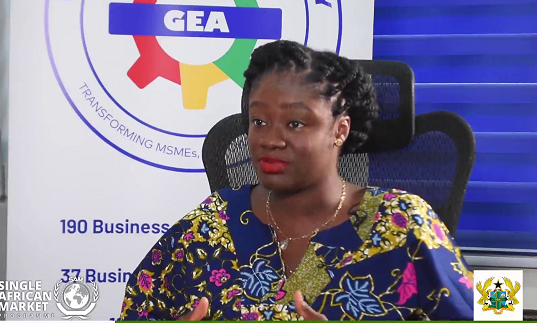Businesses seeking to explore the numerous opportunities that are being offered by the African Continental Free Trade Area (AfCFTA) will have to formalize their operations and pay the right taxes to support government’s quest to build strong and competitive local brands that can compete in the single continental market.
“Taxes are burdensome on businesses; left to everybody no one will pay taxes, but if we are looking to grow our businesses then we have to get formalized and pay taxes,” Chief Executive Officer of the Ghana Enterprises Agency (GEA), Mrs. Kosi Yankey-Ayeh, told Single African Market in an interview.
According to her, most small and medium enterprises have failed to formalise their business to avoid paying taxes which ends up stalling their growth and competitiveness.
Besides taxation, the GEA boss also called for prudent efforts aimed at formalizing Ghana’s largely informal economy to better help the operations of businesses in the country, especially as the seek to leverage the AfCFTA market.
“We need to look at how we can prepare our local businesses to take advantage of the AfCFTA market. The question is not only about taxation but whether we have businesses with the right products, standards and sustainable for the single market,” she indicated.
Ghana’s business landscape is made up of an estimated 80percent small and medium enterprises out of which about 70percent are informal and do not pay taxes but may pay some form of levies.
Mrs. Yankey-Ayeh noted that when Covid struck, it was largely the businesses in the formal sector that benefited from government interventions because they were registered and had tax records which made them easily to be recognised.
“The goal for Ghana now is to figure out how to formalise the informal economy and the GEA will play a major role by way of sensitization about the need to get their businesses formalized and the various agencies that they could turn to for any regulatory support.
A working partnership between GEA and the Food and Drugs Authority has seen as providing opportunities for SMEs to get regulatory support to over 900 businesses and products.
“This is usually not an easy thing to do; so, we create the opportunity to work with businesses, entrepreneurs and people who have ideas about MSMEs generally,” she stressed.
